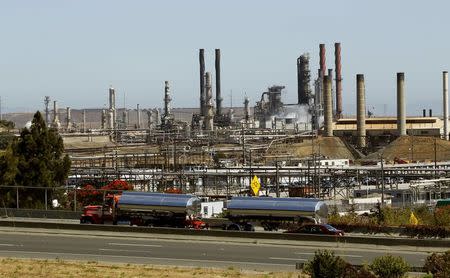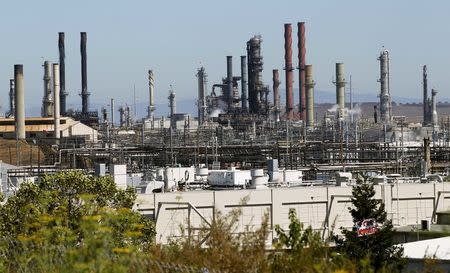Chevron sees big profits in California despite regulations
By Ernest Scheyder RICHMOND, Calif. (Reuters) - The land of liberal politics, electric cars and strict pollution controls might seem like an odd place to drop $1 billion into a 115-year-old oil refinery. Chevron Corp sees an entirely different landscape in California: a uniquely isolated market, closed to new competitors, where the price of gasoline can skyrocket when even one refinery goes down. The company plans to make a fortune here - in part from the expected misfortunes of rival refineries in the state, who after Chevron's renovations will have older technologies and potentially more frequent outages. The $1 billion investment will go into Chevron's refinery in Richmond, an industrial city northeast of San Francisco. Analysts said the renovations, started this summer and scheduled for completion by 2019, will likely make the plant more reliable than the 13 other refineries operating in a state with high and volatile gasoline prices. That means Chevron may be well-positioned to profit from rivals' breakdowns, such as the February 2015 explosion at Exxon Mobil's refinery in Torrance. The outage kept the refinery from returning to full capacity for more than a year and pushed state gasoline prices to an 18-month high, boosting margins for other state refineries. Outages aside, Chevron also stands to profit from serving the California gasoline market, the world's third largest, behind only the rest of the United States and China. "Californians like clean air, and they like helping the environment," said Dave Hackett, a refinery analyst at Stillwater Associates. "But at the end of the day, they're not going to give up their cars." For a graphic showing surging gasoline use in California, see: http://tmsnrt.rs/2ePvIRs The state’s thicket of fossil-fuel regulations has an upside for companies that can navigate it - most notably, a near certainty that no new competitors will open in California, which had more than twice as many refineries in the mid-1980s. That trend may continue. Among the state’s ambitious clean air goals is Governor Jerry Brown’s target of generating half of California’s power from renewable sources by 2030. 'INSULATED MARKET' California is also the nation’s largest auto market and an island of expensive retail gasoline. California’s pump prices are the highest in the contiguous United States because the state requires a one-off blend to curb smog, which few refineries produce. Gasoline refined in nearby Washington state, for instance, can't be sold in California. Transportation costs also drive up gas prices. With no gasoline pipelines flowing into the state, fuel must be shipped by truck or boat. "To be a refiner in California is difficult and tough, but it can also be lucrative," said John Auers, a refinery industry consultant with Turner Mason. "It's an insulated market, and that protects your margins.” Amid the high prices, California Attorney General Kamala Harris launched a probe earlier this year into whether Chevron and other state refiners have manipulated gasoline prices. The companies deny the charges. Investigators are specifically examining price hikes during periods of refinery outages, according to a subpoena from Harris, who is also a U.S. Senate candidate. Chevron has said it will cooperate with the investigation. Chevron’s Richmond refinery is the state’s largest producer of jet fuel, supplying San Francisco's airport at a time when air travel demand continues to soar. "Clearly, we see continued opportunity within California," said Joe Naylor, Chevron's vice president for policy, government and public affairs. The refinery renovation, he said, "is a sign that we remain committed to being in California as long as the business environment remains conducive to us." Chevron declined to detail expected margins for the Richmond plant, but said it expects to recoup its investment. BICYCLES IN BEVERLY HILLS? Brown signed a law two months ago that aims to cut California's greenhouse gas emissions to 40 percent below 1990 levels by 2030. The bill was unpopular among the state's oil companies who claimed it would push up consumer gas prices, which already average 57 cents more per gallon than the U.S., according to AAA, a nonprofit association of U.S. travel clubs. Chevron's refinery, however, will meet or exceed California's emissions, safety and other environmental standards, the company said. Chevron is replacing its refinery's antiquated hydrogen plant - a crucial component for a refinery - and installing new hydrogen-purifying equipment and building a new cogeneration power plant, which uses heat from the refining process to generate electricity, lowering Chevron's power costs. In Richmond, a city of roughly 100,000 that was a major shipbuilding port during World War Two, residents who had fought Chevron's Richmond expansion efforts. Environmental groups cited a refinery fire in 2012 at the Richmond plant in arguing that Chevron cannot safely operate the plant in a densely populated region. Chevron rejects that criticism. "If we look at the operation of our facilities around the world, I would stack our record up against anybody," said Naylor, the Chevron executive. California's political and regulatory environment has driven other oil giants away from the state. Exxon sold its Torrance refinery - its only California refinery - to PBF Energy last summer for $537 million, saying the sale was part of a "strategic assessment of the site and how it fits with our refining portfolio." Oil producer Occidental Petroleum Corp fled California in 2014 for Texas, well known for its business-friendly policies. "Maybe the people in Beverly Hills should park their Rolls Royces and drive bicycles going forward," Steve Chazen, then-CEO of Oxy said in early 2014 when detailing the company's exit from the state and describing his frustration with its energy regulations. But while others may leave, Chevron's rival California refiners see opportunity as well. Tom O'Malley, CEO of PBF Energy, called California "a very attractive market," and noted the company bought Exxon's Torrance refinery "at a very attractive purchase price." Phillips 66, which owns two California refineries, told investors earlier this year that demand in California for gasoline continues to rise. Company Chief Executive Greg Garland put it this way: "Margins have been very good in California." (Reporting by Ernest Scheyder; Additional reporting by Erwin Seba; Editing by Terry Wade and Brian Thevenot)


